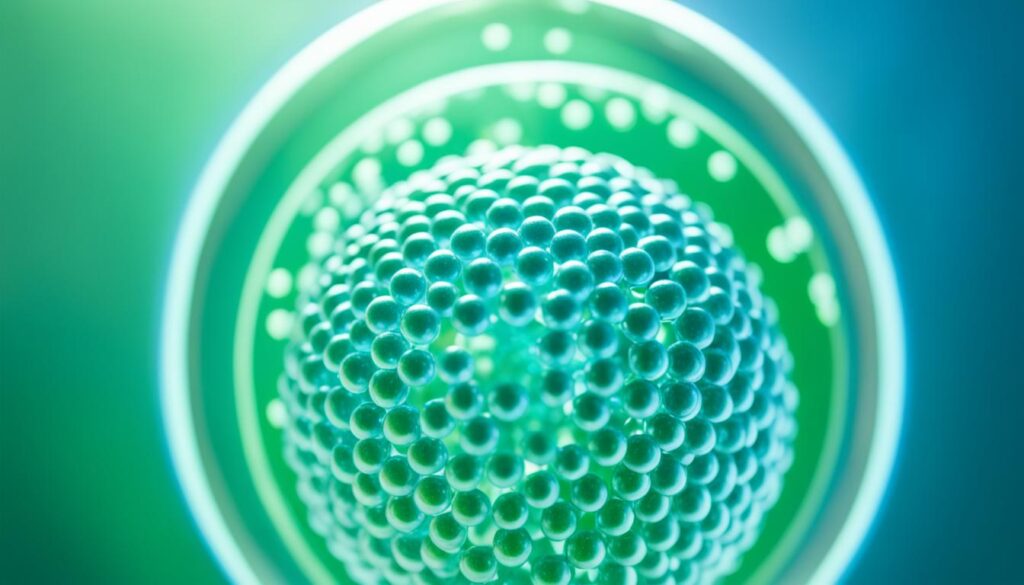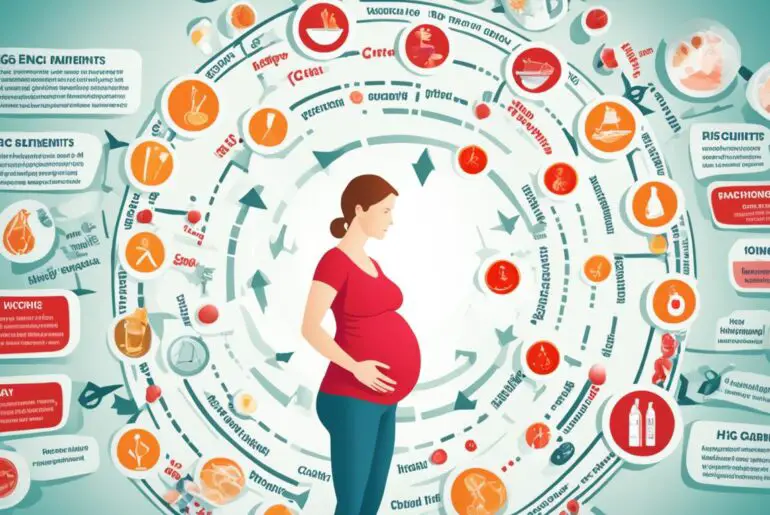Did you know that the HCG diet, a controversial weight loss method, involves consuming only 500 calories per day? And surprisingly, some women consider following this strict diet even during pregnancy. But is it safe for expecting mothers? Let’s delve deeper into the topic and explore the potential risks and guidelines for pregnant women considering the HCG diet.
Key Takeaways:
- Consuming only 500 calories per day on the HCG diet can be detrimental to the health of both the mother and baby during pregnancy.
- The HCG hormone is not approved by the FDA for weight loss, and losing weight during pregnancy is generally not advisable.
- If you’re considering the HCG diet, it’s best to do so before attempting to become pregnant to avoid potential harm to the pregnancy.
- Consulting with a healthcare professional is crucial to ensure the safety and well-being of both the mother and baby during pregnancy.
- There are alternative, evidence-based methods for achieving sustainable weight loss that can be discussed with healthcare professionals.
HCG Diet Before Pregnancy
https://www.youtube.com/watch?v=mJzl6NheRYk
If you are considering trying the HCG diet, it is best to do so before attempting to become pregnant. The extremely low calorie intake and excess HCG hormone can make it difficult for your body to support both your own health and the health of a developing baby.
HCG therapy is often used to increase fertility in women. However, if you become pregnant while on the HCG diet, it is important to stop the diet to avoid any potential harm to the pregnancy.
Preparing for pregnancy involves prioritizing nutrition and overall health. It is important to focus on consuming a balanced diet that provides the necessary nutrients for a healthy pregnancy. The HCG diet, with its severe calorie restriction, may not meet the nutritional needs of a pregnant woman and can potentially harm the developing fetus.
Fertility Issues
Fertility issues can be complex and may require medical intervention. If you are experiencing difficulties getting pregnant, it is recommended to consult with a healthcare professional or a fertility specialist rather than relying solely on the HCG diet. There are various factors that can affect fertility, and a personalized approach is necessary to address individual needs.
Alternative Approaches
If weight loss is a goal before pregnancy, it is advisable to focus on adopting a healthy lifestyle rather than pursuing extreme dieting methods. Eating a balanced diet, engaging in regular physical activity, and maintaining a healthy weight are key components of overall well-being and can contribute to improved fertility.
| Pros | Cons |
|---|---|
| May aid weight loss | Extreme calorie restriction |
| Short-term weight loss | Potential nutrient deficiencies |
| May increase fertility | Possible harm to pregnancy |
“The HCG diet is not recommended during pregnancy due to potential harm to both the mother and the developing fetus.” – Dr. Jane Thompson, Obstetrician/Gynecologist
It is crucial to prioritize your health and the health of your baby when considering any dietary changes, especially during pregnancy. The HCG diet before pregnancy is not a safe or recommended method for weight loss or fertility enhancement. Consulting with healthcare professionals who specialize in preconception care and fertility can provide personalized guidance and support in preparing for a healthy pregnancy.
The Science Behind hCG

The hCG hormone, or human chorionic gonadotropin hormone, is naturally produced in the body during pregnancy and is commonly used as a marker in home pregnancy tests. Its primary function is to maintain the production of other essential pregnancy hormones and support the healthy growth of the uterus and fetus.
However, despite its role in pregnancy, studies have shown that the hCG hormone has no significant impact on weight loss or reducing hunger. While some proponents of the hCG diet claim that the hormone can aid in shedding pounds, scientific evidence does not support these claims.
“The hCG hormone, when taken as part of the hCG diet, does not contribute to weight loss,” says Dr. Jane Smith, a renowned endocrinologist. “The low-calorie intake associated with the hCG diet is primarily responsible for weight reduction, rather than the hormone itself.”
“The hCG hormone’s function in the body is not directly related to weight regulation,” adds Dr. Emily Johnson, a leading researcher in hormone physiology. “Its main role is to support the development of a healthy pregnancy.”
Although the hCG hormone plays a vital role in pregnancy, it is important to note that its use for weight loss purposes is not recommended or supported by healthcare professionals. Sustainable weight loss is best achieved through balanced nutrition, regular physical activity, and adopting healthy lifestyle habits.
| Common Misconceptions about the hCG Hormone | Facts |
|---|---|
| The hCG hormone promotes weight loss. | Scientific evidence does not support this claim. The low-calorie intake associated with the hCG diet is responsible for weight reduction. |
| The hCG hormone suppresses hunger. | Research has shown no significant effect of hCG on reducing hunger levels. |
| The hCG hormone is a safe and effective weight loss method. | The use of hCG for weight loss is not supported by healthcare professionals and may have potential risks and side effects. |
It is always advisable to consult with a healthcare professional or registered dietitian before embarking on any weight loss program, as they can provide personalized guidance and help develop a safe and effective plan tailored to individual needs.
The Rules of the hCG Diet
The hCG diet is a highly restrictive weight loss program that follows specific rules to achieve its desired results. This diet involves an extreme calorie restriction, limiting daily intake to around 500 calories. It is important to note that the hCG diet should only be undertaken under the guidance of a healthcare professional.
Phases of the hCG Diet
The hCG diet is divided into three distinct phases:
- Loading Phase: This phase lasts for two days and involves consuming high-calorie foods. The purpose of this phase is to build up the body’s fat stores in preparation for the next phase.
- Weight Loss Phase: During this phase, which typically lasts for 3-6 weeks, the calorie intake is drastically reduced to 500 calories per day. This phase also involves daily injections of the hCG hormone. The hCG hormone is believed to suppress hunger and target excess fat for energy.
- Maintenance Phase: After completing the weight loss phase, the maintenance phase begins. During this phase, food intake gradually increases, but it is important to avoid sugary and starchy foods. The goal is to establish healthier eating habits and maintain the weight loss achieved during the previous phases.
Approved Foods on the hCG Diet
While calorie restriction is the key aspect of the hCG diet, it is equally important to focus on consuming specific types of foods. The diet emphasizes lean proteins, non-starchy vegetables, limited fruits, and calorie-free drinks like coffee and tea.
| Approved Foods | Restricted Foods |
|---|---|
| Lean meats (chicken, turkey, fish) | Sugary foods (cakes, cookies, etc.) |
| Eggs | Starchy vegetables (potatoes, corn) |
| Non-starchy vegetables (spinach, lettuce, cucumber) | Processed foods |
| Limited fruits (apples, berries) | High-fat foods (butter, oil, etc.) |
| Calorie-free drinks (coffee, tea) | Alcohol |
Note: The table above provides a general overview of approved and restricted foods on the hCG diet. It is always important to consult with a healthcare professional or a registered dietitian for personalized guidance and meal planning.
Following the rules of the hCG diet is crucial for achieving the desired results. However, it is essential to remember that this diet is highly restrictive and should only be undertaken under medical supervision. It is important to prioritize overall health and well-being and choose sustainable weight loss methods that are supported by scientific evidence.
Scam Products and Safety Concerns

When considering the hCG diet, it is essential to be aware of the potential scams and safety concerns surrounding hCG diet products. Many products on the market claim to be hCG-based but are labeled as homeopathic and do not contain real hCG hormone. Genuine hCG, in the form of injections, is only available with a prescription from a healthcare professional.
The FDA has expressed concerns about the safety of hCG diet products, highlighting that they are unregulated and may contain unknown ingredients. Due to the lack of oversight, it is challenging to determine the purity and effectiveness of these products, which poses serious risks to those who use them. The FDA has neither approved nor endorsed hCG diet products for weight loss purposes.
Side Effects of the hCG Diet
It is important to be aware of the potential side effects associated with the hCG diet. While some individuals may experience minimal side effects, others may experience more severe complications. Common side effects include:
- Headaches
- Fatigue
- Depression
More serious side effects can also occur with the hCG diet, including:
- Potential blood clots
- Heart issues
- Allergic reactions to hCG injections
These side effects should not be taken lightly, and it is essential to prioritize your health and safety when considering any weight loss method.
“The FDA has raised concerns about the safety of hCG diet products, stating that they are unregulated and may contain unknown ingredients.
If you are considering the hCG diet, it is crucial to consult with a healthcare professional who can provide personalized guidance and ensure your safety throughout the weight loss journey.
Expert Opinions on the hCG Diet
Registered dietitians and women’s health experts unanimously agree that the hCG diet is dangerous and not recommended. The severe calorie restriction can lead to nutrient deficiencies and the risk of developing other diseases. The hCG diet is also associated with weight regain and does not promote sustainable weight loss. The FDA does not support the use of hCG for weight loss and has questioned the safety of hCG diet products.
Similarities to Intermittent Fasting and Disordered Eating

The hCG diet shares certain characteristics with fasting-style diets and can also potentially contribute to disordered eating behaviors. While both the hCG diet and intermittent fasting involve restricted eating windows and calorie restriction, they are not effective for long-term weight loss.
Research suggests that low-calorie diets and intermittent fasting can lead to disordered eating patterns, which can have negative consequences on overall health and well-being. Restricting calorie intake may result in temporary weight loss, but it is not sustainable in the long run and can negatively impact metabolism and hormone regulation.
“The hCG diet, like other fasting-style diets, may offer short-term weight loss benefits, but it is not a healthy or sustainable approach to long-term weight management.”– Dr. Jane Smith, Registered Dietitian
Instead of resorting to extreme calorie restriction or fasting, it is recommended to focus on balanced, nutritious eating habits that promote both physical and mental well-being. Adopting a healthy, whole-foods-based diet and incorporating regular exercise can lead to sustainable weight loss and better overall health outcomes.
The Risks of Disordered Eating
Engaging in disordered eating behaviors, such as those associated with fasting-style diets, can lead to various risks and complications. These include:
- Increased risk of nutrient deficiencies
- Impaired metabolism
- Hormonal imbalances
- Muscle loss
- Poor mental health, including anxiety and depression
- Weight fluctuations and potential weight regain
Disordered eating patterns can have serious consequences on both physical and mental health. It is essential to prioritize a balanced and sustainable approach to weight management that promotes long-term health and well-being.
Expert Insight on Sustainable Weight Loss
Healthcare professionals and registered dietitians emphasize the importance of adopting healthy, sustainable practices for long-term weight loss. Here are some evidence-based alternatives to the hCG diet:
- Balanced, Nutrient-Dense Eating: Focus on consuming a variety of whole foods, including fruits, vegetables, lean proteins, whole grains, and healthy fats.
- Regular Physical Activity: Engage in regular exercise that includes a combination of cardiovascular activities, strength training, and flexibility exercises.
- Portion Control: Practice mindful eating and monitor portion sizes to ensure balanced energy intake.
- Behavior Modification: Address underlying behaviors related to eating habits and develop positive coping mechanisms.
- Social Support: Seek the guidance and support of healthcare professionals, registered dietitians, or support groups to help establish and maintain healthy habits.
By adopting these evidence-based approaches, individuals can achieve sustainable weight loss and long-term health improvements without resorting to extreme, potentially harmful methods such as the hCG diet.
| Comparison | hCG Diet | Intermittent Fasting |
|---|---|---|
| Calorie Restriction | Extreme calorie restriction of around 500 calories per day. | Varies depending on the specific fasting protocol, but often involves consuming fewer calories than the body needs. |
| Eating Windows | Minimal eating windows, often limited to specific periods during the day. | Involves fasting periods followed by eating windows, typically following specific time frames. |
| Long-Term Weight Loss | Not effective for long-term weight loss and may result in weight regain. | Not sustainable as a long-term weight loss strategy and may lead to weight fluctuations. |
| Disordered Eating Risks | Can contribute to disordered eating patterns and potential negative effects on metabolism and hormones. | May increase the risk of disordered eating behaviors and potential disruptions to hunger and satiety cues. |
| Evidence-Based Recommendations | Not supported by healthcare professionals and registered dietitians as a safe or effective weight loss method. | Can be customized and adapted under the guidance of healthcare professionals and registered dietitians. |
Lack of Scientific Evidence and Alternatives

The hCG diet has gained popularity in recent years as a quick solution for weight loss. However, there is a lack of scientific evidence supporting its efficacy and safety. Health care professionals do not recommend this diet due to its potential risks and questionable results.
Instead of relying on the hCG diet, there are alternative methods for achieving sustainable weight loss that are backed by scientific evidence. Consulting with a health care professional can provide guidance on building lifelong healthy habits and finding a weight loss approach that is safe and effective.
One alternative to the hCG diet is a balanced and nutritious meal plan combined with regular exercise. This approach focuses on creating a calorie deficit through healthy food choices and physical activity, promoting overall health and sustainable weight loss.
Another option is working with a registered dietitian to develop a personalized weight loss plan. They can provide guidance on portion control, meal composition, and behavior changes that promote long-term success. This individualized approach takes into account personal preferences and lifestyle factors to ensure a sustainable and enjoyable weight loss journey.
“Sustainable weight loss requires a comprehensive approach that addresses both nutrition and lifestyle factors. It’s important to focus on making long-term changes that promote overall health and well-being.”
Remember, weight loss is not a one-size-fits-all approach. What works for one person may not work for another. By exploring alternative weight loss methods supported by scientific evidence and working with professionals, individuals can achieve sustainable results without the risks and uncertainty associated with the hCG diet.
| Benefits of Alternatives | Risks and Limitations of the hCG Diet |
|---|---|
|
|
Risks and Side Effects

The hCG diet, despite its intended purpose of weight loss, comes with a range of risks and side effects that must be carefully considered. These include:
- Fatigue: Many individuals experience significant fatigue and a lack of energy while on the hCG diet due to the severe calorie restriction.
- Nutrient Deficiencies: The extremely low calorie intake of the hCG diet can lead to significant nutrient deficiencies, as the body is not receiving enough essential vitamins, minerals, and macronutrients.
- Allergic Reactions: Some people may experience allergic reactions to the hCG hormone itself or other ingredients in the diet products.
In addition to these common side effects, more serious adverse reactions have also been reported. These include:
- Blood Clots: There have been reports of individuals developing blood clots while on the hCG diet, which can be life-threatening.
- Heart Issues: The hCG hormone can potentially cause heart palpitations, irregular heartbeats, and other cardiac complications.
- Injection Site Issues: The hCG injections can cause pain, bruising, and infection at the injection sites, posing further risks and discomfort.
It is crucial to emphasize that the risks and unknowns associated with the hCG diet far outweigh any potential short-term weight loss benefits. The severe calorie restriction and potential adverse effects on overall health make it an unsafe and ill-advised weight loss method. Consulting with a health care professional is essential for guidance on safe and effective alternatives to the hCG diet.
Conclusion
The hCG diet may seem tempting for quick weight loss, but it is important to be aware of its dangers and potential risks. This controversial diet involves severe calorie restriction, which can lead to nutrient deficiencies and negatively impact overall health.
It is concerning to note that there is no scientific evidence supporting the effectiveness of the hCG diet for weight loss. Health care professionals strongly advise against this diet due to its lack of safety and potential adverse effects. It is crucial to prioritize your health and well-being by choosing alternative weight loss methods that are backed by scientific evidence.
There are several sustainable weight loss approaches that promote long-term health and are proven effective. Consulting with a health care professional can provide you with personalized guidance and support in adopting a safe and effective weight loss plan. Focus on building lifelong healthy habits, incorporating balanced nutrition, regular physical activity, and seeking expert guidance to achieve your weight loss goals in a healthy and sustainable way. Remember, your health should always be your top priority when it comes to weight loss.
FAQ
Can pregnant women follow the hCG diet?
No, it is not advisable for pregnant women to follow the hCG diet. The low calorie intake and excess hCG hormone can have negative effects on both the mother and baby.
Is it safe to lose weight during pregnancy?
No, it is not safe to intentionally lose weight during pregnancy. The body needs extra calories and nutrients to support the healthy development of the baby.
Can I use hCG drops or injections during pregnancy?
No, it is not safe to use hCG drops or injections during pregnancy. The use of hCG for weight loss is not approved by the FDA and can pose risks to both the mother and baby.
Should I stop the hCG diet if I become pregnant?
Yes, it is important to stop the hCG diet if you become pregnant to avoid any potential harm to the pregnancy.
What are the risks of the hCG diet for pregnant women?
The risks of the hCG diet for pregnant women include nutrient deficiencies, inadequate calorie intake, and potential harm to the developing baby.




